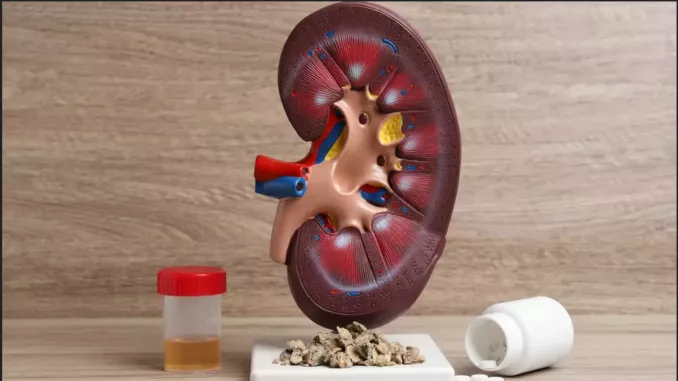![Hepatitis B [FamilyDoctor.org] Hepatitis B [FamilyDoctor.org]](https://static.netnaija.com/i/APK4OnwVN0B.webp)
Dr Gabriel Adakole, a public health expert, has advocated improved awareness and prompt treatment of Hepatitis C, to prevent severe health complications in the country.
He also urged Nigerians not to neglect the signs of the disease. Adakole, an advocate for Hepatitis awareness, stated this in an interview with the News Agency of Nigeria (NAN) on Sunday in Abuja, in commemoration of the 2024 World Hepatitis Day.
NAN reports that Day with the theme: "It's Time for Action," is a pivotal occasion to spotlight the ongoing global fight against viral hepatitis, a significant public health challenge affecting millions of people worldwide.
Despite substantial progress in research and healthcare, viral hepatitis continues to be a major cause of chronic renal diseases, contributing significantly to global morbidity and mortality rates.
Adakole highlighted the importance of early diagnosis and management of the disease to reduce liver damage, Cirrhosis, and liver cancer among infected individuals.
"Hepatitis C infects the liver, an organ in your belly that produces bile for digestion and rids your body of toxins.
"The virus causes inflammation that slowly damages your liver over many years and leaves it scarred.
"Cirrhosis, a severe form of liver disease, occurs due to various causes, and results in scarring that slowly replaces healthy tissue, eventually blocking blood flow and impairing liver function.
"This prevents the liver from filtering toxins and breaking down nutrients and medications efficiently. Over time, cirrhosis can lead to liver failure," he said.
According to Adakole, many Nigerians remain unaware of their Hepatitis C status due to inadequate screening and misinformation.
"We need to prioritise public health campaigns that educate the population on the risks of untreated Hepatitis C and the benefits of timely medical intervention.
"As Cirrhosis progresses, symptoms like fatigue, loss of appetite, itching, yellowing of the skin, easy bruising, darkened urine, and swelling in the abdomen and legs may appear.
"In severe cases, people may experience nausea, cognitive impairment, and memory issues," he added.
According to him, drinking too much alcohol can exacerbate liver problems, leading to swelling and fat accumulation in the liver, which can progress to Cirrhosis.
"The amount of alcohol causing liver damage varies among individuals, so it is crucial to seek medical advice if alcohol consumption affects daily life.
"Non-alcoholic causes of liver damage include Non-alcoholic Steatohepatitis (NASH), linked to obesity, diabetes, high cholesterol, and high blood pressure.
"Chronic Hepatitis, including Hepatitis C, is the most common cause of chronic liver disease. Other causes include autoimmune diseases, medications, bacteria, and other viruses," he stated.
The conditions, he said, narrow or block bile ducts that also inflame and damage the liver.
"Treatments depend on the cause but often involve medication or minor procedures to clear the ducts.
"Certain medications, herbs and genetic conditions can also contribute to Cirrhosis," he noted.
Adakole, therefore, called on the government to invest in accessible and affordable treatment options to ensure that all Nigerians, regardless of socio-economic status, can receive the care they need.
He explained that the diagnosis of Cirrhosis involved physical examination, symptom history, blood tests, imaging (ultrasound, X-ray, MRI), and sometimes a biopsy.
"Addressing Hepatitis C is crucial for improving public health outcomes and achieving the global goal of eliminating viral hepatitis by 2030.
"Although there's no cure for existing liver scarring, treatments can slow its progression.
"This includes addressing the underlying cause, such as therapy for alcohol addiction, weight loss for fatty liver, or medications for infections and autoimmune disorders.
"Without treatment, Hepatitis C can lead to Cirrhosis in about 20 per cent of those infected," he stated.
The public health expert identified Cirrhosis as the end stage of many decades of inflammation and injury, adding that treating Hepatitis C prevents Cirrhosis.
"Once you have Cirrhosis, your treatment becomes a liver transplant or potentially very complicated cancer therapy.
"And by preventing Cirrhosis, you will avoid liver failure and liver cancer," he said.
NAN reports that World Hepatitis Day, observed annually on July 2, aims to raise global awareness of Hepatitis and encourage prevention, diagnosis and treatment efforts.
Nigeria has a prevalence rate of 8.1% and 1.1% for HBV and HCV among adults aged 15 years to 64 years.
According to the Nigeria HIV-AIDS Indicator and Impact Survey, 2018 (NAIIS 2018), the country has more than 20 million people living with Hepatitis B, C, or both. The study concluded that more than 80% of people who have the disease do not know their status.
















Comments